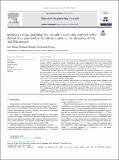Por favor, use este identificador para citar o enlazar a este item:
http://hdl.handle.net/10261/260143COMPARTIR / EXPORTAR:
 SHARE SHARE
 CORE
BASE CORE
BASE
|
|
| Visualizar otros formatos: MARC | Dublin Core | RDF | ORE | MODS | METS | DIDL | DATACITE | |

| Título: | Modeling a biogas upgrading PSA unit with a sustainable activated carbon derived from pine sawdust. Sensitivity analysis on the adsorption of CO2 and CH4 mixtures |
Autor: | Durán Vera, Inés CSIC ; Rubiera González, Fernando CSIC ORCID ; Pevida García, Covadonga CSIC ORCID | Palabras clave: | Activated carbon Biogas Biomethane Modeling Pine sawdust Pressure Swing Adsorption |
Fecha de publicación: | 22-sep-2021 | Editor: | Elsevier | Citación: | Chemical Engineering Journal 428: 132564 (2022) | Resumen: | Pressure Swing Adsorption (PSA) is one of the implemented technologies for removing carbon dioxide in biogas streams. Different adsorbents, mostly zeolite-based, and process configurations have been patented and commercially demonstrated. In this study, we have developed a numerical model to successfully describe the dynamic performance of biomass-derived activated carbon in biogas purification. It is the first step in designing a biomass-based carbon capture unit within the bioenergy and circular economy context. Microporous activated carbon pellets prepared from pine sawdust by physical activation with CO2 was the adsorbent material choice. The model was built with the fittings of single-component adsorption isotherms of CO2 and CH4 at different temperatures to the Langmuir-Freundlich model and the Ideal Adsorbed Solution Theory (IAST) to account for multicomponent adsorption. The kinetics of mass transfer in the solid phase was described by the Linear Driving Force model (LDF). The dynamic simulations were performed with the aid of the commercial software Aspen Adsorption and experimental data previously obtained in the laboratory used for the model validation [1]. The model was applied to address the separation performance of a biogas upgrading biomass-based PSA process by running a parametric study to determine the influence of key performance parameters. The sensitivity analysis concluded that a single stage 4-step PSA can produce methane with a purity above 95% and a recovery of around 60% in a configuration with P/F ratios (quotients of molar flows of CH4 in the purge and the feed streams) between 0.67 and 1 for an adsorption pressure of 3 bar. | Versión del editor: | https://doi.org/10.1016/j.cej.2021.132564 | URI: | http://hdl.handle.net/10261/260143 | DOI: | 10.1016/j.cej.2021.132564 | ISSN: | 1385-8947 |
| Aparece en las colecciones: | (INCAR) Artículos |
Ficheros en este ítem:
| Fichero | Descripción | Tamaño | Formato | |
|---|---|---|---|---|
| Modeling_biogas_Duran.pdf | 6,08 MB | Adobe PDF |  Visualizar/Abrir |
CORE Recommender
SCOPUSTM
Citations
35
checked on 21-abr-2024
WEB OF SCIENCETM
Citations
23
checked on 23-feb-2024
Page view(s)
88
checked on 24-abr-2024
Download(s)
547
checked on 24-abr-2024
Google ScholarTM
Check
Altmetric
Altmetric
Este item está licenciado bajo una Licencia Creative Commons

